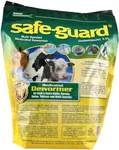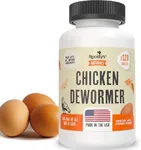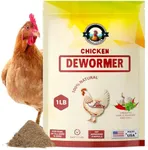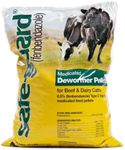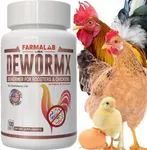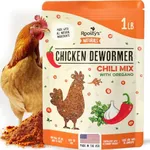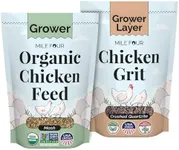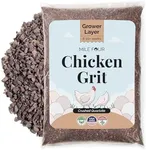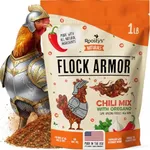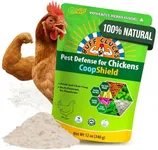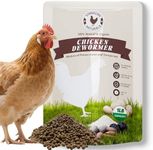Buying Guide for the Best Poultry Wormer
Choosing the right poultry wormer is essential for maintaining the health and productivity of your flock. Wormers help to control and eliminate internal parasites that can affect the overall well-being of your birds. When selecting a poultry wormer, it's important to consider several key specifications to ensure you pick the best fit for your needs. Understanding these specifications will help you make an informed decision and keep your poultry healthy and thriving.Active IngredientThe active ingredient in a poultry wormer is the chemical component that targets and eliminates the worms. This spec is important because different active ingredients are effective against different types of worms. Common active ingredients include fenbendazole, ivermectin, and levamisole. To navigate this spec, identify the types of worms prevalent in your area or affecting your flock, and choose a wormer with an active ingredient known to be effective against those specific worms. If you're unsure, consulting a veterinarian can help you determine the best active ingredient for your situation.
Spectrum of ActivityThe spectrum of activity refers to the range of worm species that the wormer can effectively treat. This spec is crucial because a broad-spectrum wormer can target multiple types of worms, providing comprehensive protection for your flock. Broad-spectrum wormers are ideal for general use, while narrow-spectrum wormers are more suitable for targeting specific worm infestations. To pick the right one, consider whether you need a general treatment for various worms or a targeted approach for a known infestation.
FormulationThe formulation of a poultry wormer indicates how the product is administered, such as in liquid, powder, or pellet form. This spec is important because it affects ease of use and how well the birds will accept the treatment. Liquid formulations can be added to drinking water, powders can be mixed with feed, and pellets can be given directly. To choose the right formulation, consider the size of your flock, your feeding practices, and how easily you can administer the treatment. For large flocks, a formulation that can be mixed with water or feed may be more practical.
Dosage and AdministrationDosage and administration refer to the amount of wormer needed and how it should be given to the birds. This spec is important because proper dosing ensures the effectiveness of the treatment and prevents underdosing or overdosing. Dosage can vary based on the size and age of the birds, as well as the severity of the infestation. To navigate this spec, carefully read the manufacturer's instructions and follow the recommended dosage guidelines. If you have a mixed flock with birds of different sizes, you may need to adjust the dosage accordingly.
Withdrawal PeriodThe withdrawal period is the time that must pass between the last administration of the wormer and when the eggs or meat from treated birds can be safely consumed. This spec is important for ensuring food safety and compliance with regulations. Withdrawal periods can range from a few days to several weeks, depending on the active ingredient and formulation. To pick the right wormer, consider how the withdrawal period will impact your egg or meat production schedule. If you rely on continuous egg production, choose a wormer with a shorter withdrawal period.
Safety and Side EffectsSafety and side effects refer to the potential risks and adverse reactions associated with the use of the wormer. This spec is important because it affects the overall health of your birds and the safety of the product. Some wormers may cause mild side effects, such as temporary loss of appetite or diarrhea, while others may have more serious risks. To navigate this spec, review the safety information provided by the manufacturer and consider any known health issues in your flock. If your birds have a history of sensitivity to certain medications, choose a wormer with a lower risk of side effects.

